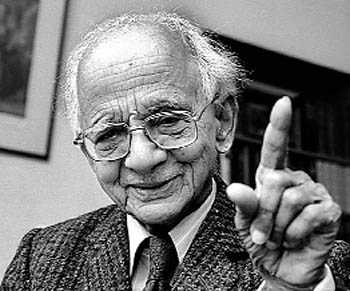
‘UNKNOWN INDIAN’: Nirad C Chaudhuri
By K. Natwar Singh
NIRAD C Chaudhuri died in Oxford on August 1, 1999, at the age of 101. I knew Nirad Babu for over 40 years. He was not an easy man to make friends with. He could be cantankerous, outrageously outspoken, a bad listener. But he was a very great writer. He wrote better English than Jawaharlal Nehru did. If I were asked to name five non-fiction books in the 20th century, The Autobiography of an Unknown Indian would be one of them. It appeared in the summer of 1951 and created a sensation. Overnight the unknown Indian became the known Indian.
On the opening page of my copy of the American edition of the autobiography, Nirad Babu wrote: “Anybody can make history. Only a great man can write it.” A Passage to England (a dig at EM Forster), he wrote on my copy. “The conversation of the old and young ends generally with contempt or pity on either side,” said the great Dr. Johnson, ‘but I do not agree, for I have enjoyed Natwar’s conversation, and I hope Natwar, too, even though less than half my age, has enjoyed mine.’
Nirad Babu was a great admirer of that arch-imperialist Rudyard Kipling, whom I loathed. I was out-and-out a Forster fan. Nirad Chaudhuri could not stand Forster. Nevertheless he asked me to write to Forster asking him if he would see Nirad C Chaudhuri. They did meet in Cambridge. We had endless arguments on the merits and demerits of Kipling and Forster, but failed to convert each other.
In 1978 June issue of the Illustrated Weekly of India, N.C.C wrote: “On the whole I should be reconciled to my ill-fame. But a recent comment on me in this paper by my young friend Kunwar Natwar Singh ji has given me the idea of delivering a sermon on the subject. He wrote, “His reputation as an Anglophile is his doing, but he is a better Indian than most of us…This is very handsome of Kunwar Sahib, and I in my turn would say to him: To support me is more patriotic than becoming a champion of EM Forster.”
I replied a few weeks later in the same paper that, “It is better to be a champion of Forster than be a cheerleader for Kipling.”
Why have I chosen to write on Nirad C Chaudhuri? Last week I finished reading Chaudhuri’s Scholar Extraordinary: The Life of Professor the Rf. Hon Friedrich, Max Muller P.C. Max Muller did more than any other Sanskrit scholar has done to promote the knowledge of Indian thought in the West.
IF drastic steps are not taken immediately, the capital of India will come to a standstill. Delhi has more motor vehicles than Mumbai, Chennai and Kolkata put together. Each month tens of thousands of cars, buses, trucks and three wheelers are added. Even Lutyens’ New Delhi is now subject to horrendous traffic jams. Not so long ago, it took half-an-hour to reach Gurgoan from Delhi. Now at peak hours, it takes nothing short of two hours. Ambulances, carrying seriously sick patients get stuck in traffic indefinitely. In New Delhi there is another menace called: PM ki route lagi hai. All roads are blocked for at least 20 minutes. In London traffic is not held up even for the Queen or the Prime Minister. Queen’s motorcade consists of three vehicles. In Delhi the motorcades of the President and the Prime Minister consist of 15 vehicles. This is entirely unnecessary and a menace. Do not these “VVIPs” realize that they are causing immense inconvenience to tens of thousands of people?
Four other cities have similar traffic nightmares, Mexico City, Cairo, Lagos and Jakarta. We are in good company.
LAST Sunday my son Jagat Singh, MLA, visited our ancestral village of Juagina in Bharatpur district. With a population of 10,000, it is the largest village in Rajasthan. We were invited to a popular village function. Hundreds of people were sitting on the ground in freezing weather, waiting for us. I said I would speak only for five minutes as it was getting dark. A howl went up: “We have been waiting to hear you for three hours. Speak as long as you would like.” I did. Not a man left the meeting. What patience, what capacity for putting up with discomfort.
I left the Indian Foreign Service in 1984. I had four-and-a-half years left in the service. Prime Minister Indira Gandhi and I were walking down the staircase in South Block. I said: “Madam, in a day or two I will be leaving for Bharatpur. My first priority would be to acquire a khadi outfit -- kurta, Jawahar jacket etc”. Her response was immortal, “Now that you are joining politics, a thicker skin would be more useful.”



























